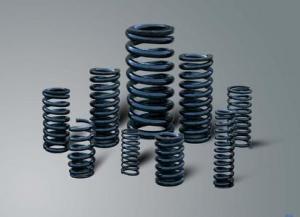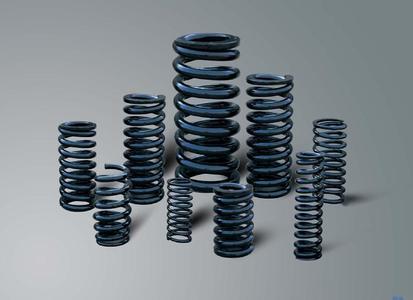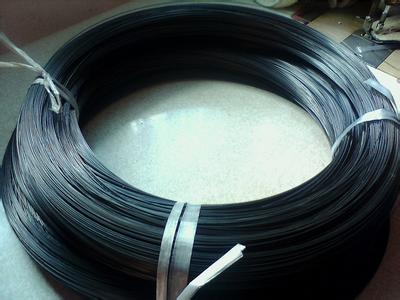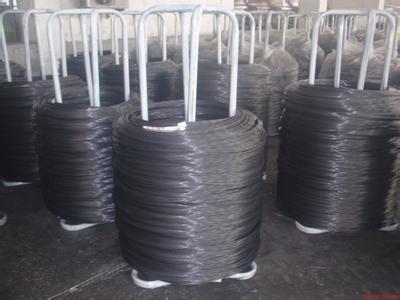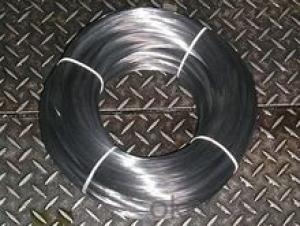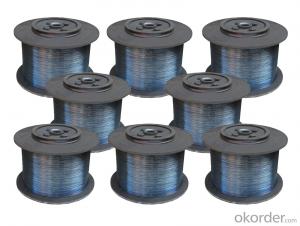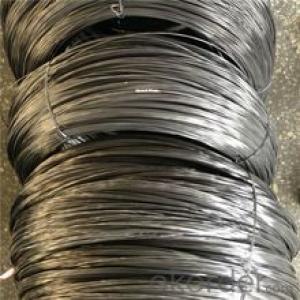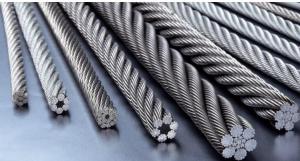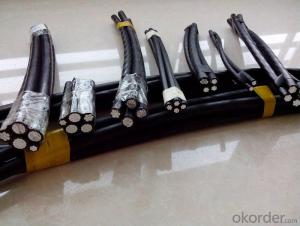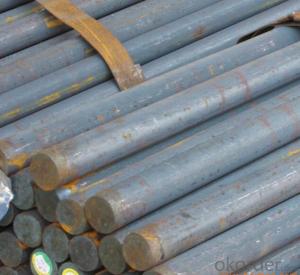High grade spring steel wire
- Loading Port:
- China Main Port
- Payment Terms:
- TT OR LC
- Min Order Qty:
- -
- Supply Capability:
- -
OKorder Service Pledge
OKorder Financial Service
You Might Also Like
Spring steel is due in the quenched and tempered condition of elastic,specially used in the manufacture of spring and spring steel. Resiliencedepends on the deformation of steel in the elasticity, that is within the scope of the regulations, the elastic deformation of the ability to bear a certain load, theload permanent deformation after removal does not appear. Spring steelshould possess excellent comprehensive properties, such as mechanical properties (especially the elastic limit, ultimate strength, yield ratio), sag resistance performance (i.e., anti sagging performance, also known as the anti relaxation property), fatigue performance, hardenability, physical and chemical properties of heat resistance, low temperature resistance, (oxidation, corrosion resistance etc.). In order to meet the performance requirements, spring steel has excellent metallurgical quality (high purity and uniformity), good surface quality (strict control of surface defects and decarburization), shape and sizeprecision.
According to GB/T 13304 "steel classification" standard, according to the basicproperties and use characteristics of spring steel, belonging to the mechanical structure with steel; according to the quality grade, which belongs to thespecial quality steel, which need to be especially strict quality control and performance of the steel in the production process. According to the Chinahabits, spring steel belongs to special steel, spring steel when makingtechnical requirements are relatively high, excellent technology directly determine the level of quality.
Classification
Classified according to chemical composition
According to the GB/T 13304 standard, spring steel for non alloy spring steelin accordance with its chemical composition (carbon spring steel) and alloy spring steel. Carbon spring steel
The carbon content of carbon spring steel (mass fraction) in general 0.62%~0.90%. According to the content of manganese is divided into generalmanganese content (mass fraction) (0.50%~0.80%) such as 65, 70, 85 andhigher manganese content (mass fraction) (0.90~1.20%), such as the 65Mnclass two.
Alloy spring steel
Alloy spring steel in carbon steel on the basis of appropriate, by adding one orseveral kinds of alloy elements to improve the mechanical properties ofhardened steel, permeability and other properties, the desired performance in order to meet the manufacturing all kinds of spring steel.
Alloy spring steel basic composition series, Si Mn spring steel, spring steel,silicon chromium chromium manganese spring steel, chrome vanadium springsteel, tungsten chromium vanadium spring steel etc.. Based on these series,with molybdenum, vanadium and boron alloy elements such as some brandsand join in order to improve the performance of some of its aspects.
In addition, also from other steel types, such as high quality carbon structuralsteel, carbon tool steel, high-speed tool steel, stainless steel, the choice of some grades of steel used as spring.
Classification according to the production processing method
The hot rolling (forging) steel hot rolling round steel, including Fang Gang, flat steel, steel plate, forging round steel, Fang Gang.
The cold drawing (rolling) steel wire, cold drawn steel strip, including material(cold drawn steel).
In accordance with the steel delivery status classification
The hot rolling (forging) steel
A. rolled (forging) delivery of steel after hot forming is made of spring, and then quenching and tempering treatment.
B. in annealing state of delivery by the cold formed steel spring, thenquenching and tempering treatment.
All the above should comply with the relevant state provisions of deliveryhardness.
The cold drawing (rolling) steel
A. steel wire
The lead bath isothermal quenching cold drawn steel wire (also called sendDeng de cold drawing steel wire spring) made only after low temperaturetempering, to eliminate stress.
The oil quenching and tempering steel cold drawn into required size,continuous heating, continuous oil quenching and tempering of lead. Springsteel wire made only for the bottom temperature of fire, in order to eliminate stress.
The cold drawn steel wire (i.e. without quenching and tempering steel)
A. to cold state of delivery.
B. with annealing, normalizing or tempering treatment delivery.
The above two kinds of delivery wire springs are needed after quenching and tempering treatment.
B. steel strip
The cold state of delivery is made of spring after low temperature tempering, to eliminate stress.
The quenched and tempered condition required delivery is made of springafter low temperature tempering, to eliminate stress.
The back fire delivery is made of spring after quenching and temperingtreatment needs
C. cold drawn steel
In the annealed state delivery after cold forming steel is made of spring, and then quenching and tempering treatment.
The other classification method
In addition to the above, there are a number of other classification methods,for example:
According to the conditions of delivery requirements can be divided according to the chemical composition (mechanical properties) delivery and press thehardenability of delivery.
According to the spring working conditions can be divided into static loadspring steel, subjected to impact load spring steel and high (low) temperaturespring and corrosion resistance of spring steel etc..
2 process performance
Edit
Spring in use shock and vibration or prolonged stress, so the requirements ofhigh tensile strength, high elastic limit, the fatigue strength of the spring steel.In the technology requirements of spring steel has certain hardenability, not easy removal, good surface quality carbon spring steel is carbon content of WC in the 0.6%-0.9% range of high-quality carbon structural steel. Alloy springsteel is mainly the Si Mn steel, their carbon content was slightly lower, mainly by increasing the silicon content of Wsi to improve performance; in addition toLuo, tungsten, vanadium alloy steel spring. In recent years, with ChinaResources, and according to the automobile, tractor design requirements of new technologies, develop new steel added boron, niobium, molybdenum and other elements in the Si Mn steel on the basis of the spring is extended service life, improve the quality of the spring.
Performance requirements
Spring in use shock and vibration or prolonged stress, so the requirements ofhigh tensile strength, high elastic limit, the fatigue strength of the spring steel.In the technology requirements of spring steel has certain hardenability, not easy removal, good surface quality carbon spring steel is carbon content of WC in the 0.6%-0.9% range of high-quality carbon structural steel. Alloy springsteel is mainly of Si Mn steel
- Q: How is special steel different from regular steel?
- Special steel is different from regular steel due to its unique composition and properties. Unlike regular steel, special steel is specifically designed to possess enhanced characteristics such as increased strength, durability, corrosion resistance, and heat resistance. Special steel is often alloyed with various elements like chromium, nickel, molybdenum, or vanadium to achieve these improved qualities, making it suitable for specific applications that require superior performance under challenging conditions.
- Q: What are the common grades of special steel?
- The specific application and desired properties determine the varying common grades of special steel. Some frequently utilized grades are: 1. Stainless steel, an alloy resistant to corrosion containing a minimum of 10.5% chromium. Grades like 304, 316, and 410 possess exceptional corrosion resistance, high strength, and good formability, making them prevalent in various industries. 2. Tool steel, specifically designed for toolmaking, renowned for its high hardness, wear resistance, and toughness. Common grades such as D2, A2, O1, and S7 possess specific properties suitable for diverse applications. 3. High-speed steel (HSS), a type of tool steel retaining its hardness and cutting ability even at high temperatures. It frequently finds use in cutting tools like drills, end mills, and taps. M2, M35, and M42 are a few well-known HSS grades. 4. Alloy steel, made by incorporating different alloying elements to enhance specific properties. Grades like 4140, 4340, and 8620, known for their high strength, toughness, and wear resistance, are commonly utilized in industries such as automotive, aerospace, and machinery. 5. Spring steel, renowned for its ability to restore its original shape after bending or twisting. Grades like 1095 and 5160 are commonly employed in the manufacturing of springs, suspension components, and hand tools. These examples merely scratch the surface of the numerous available grades of special steel, each possessing unique properties and applications. It is vital to select the appropriate grade based on the specific requirements of the intended usage.
- Q: What are the different corrosion protection methods used for special steel?
- There are several corrosion protection methods used for special steel to ensure its durability and longevity. These methods include: 1. Coatings: Applying various types of coatings, such as paint, epoxy, or zinc, can provide a protective layer on the steel surface. These coatings act as a barrier, preventing moisture and corrosive elements from coming into direct contact with the steel. 2. Galvanization: Galvanizing is a process that involves coating the steel with a layer of zinc. This creates a sacrificial barrier, as the zinc corrodes instead of the steel. Galvanized steel is commonly used in outdoor applications, such as fences, poles, and roofing. 3. Stainless steel: Special steel can also be manufactured using stainless steel, which contains a high percentage of chromium. Chromium forms a passive layer on the surface of the steel, providing excellent corrosion resistance. Stainless steel is widely used in industries such as construction, food processing, and medical equipment. 4. Cathodic protection: This method involves creating an electrical current or using sacrificial anodes to protect the steel. By introducing a more reactive metal (sacrificial anode) or applying an electrical current, corrosion is minimized as the reactive metal corrodes instead of the steel. 5. Alloying: Modifying the composition of the steel by adding elements like nickel, molybdenum, or copper can enhance its resistance to corrosion. These alloying elements form a protective layer on the surface, making the steel more resistant to rust and other forms of corrosion. 6. Passivation: Passivation is a chemical process that removes free iron from the surface of the steel and forms a protective oxide layer. This layer acts as a barrier against corrosion, enhancing the steel's resistance to rust and other forms of corrosion. 7. Proper maintenance: Regular inspection, cleaning, and maintenance of special steel are essential in preventing corrosion. Removing dirt, debris, and other contaminants from the steel's surface can help maintain its protective coatings and prevent corrosion from occurring. It is important to select the appropriate corrosion protection method based on the specific application and environmental conditions to ensure the long-term performance and durability of special steel.
- Q: How does copper influence the characteristics of special steel?
- Copper can greatly influence the characteristics of special steel by improving its strength, corrosion resistance, and electrical conductivity. The addition of copper to steel enhances its overall mechanical properties, making it more durable and resistant to wear and tear. Additionally, copper helps in preventing rust and oxidation, thus increasing the steel's resistance to corrosion. Moreover, copper enhances the electrical conductivity of steel, enabling it to be effectively used in electrical applications.
- Q: How does special steel perform in chemical processing applications?
- Due to its outstanding performance and unique properties, special steel finds wide application in chemical processing. Its high resistance to corrosion is a key advantage in this field. Specifically designed to withstand harsh chemical environments, special steel ensures reliability and durability. Compared to other materials, special steel provides superior protection against corrosion in chemical processing applications where corrosive substances are present. It exhibits exceptional resistance to acids, alkalis, and various chemical compounds, guaranteeing the integrity and longevity of equipment and components. In addition, special steel offers excellent mechanical properties, including high strength and toughness, which are essential in chemical processing. It can endure high temperatures, pressure, and mechanical stresses commonly encountered in these environments. Its robustness and ability to maintain structural integrity under extreme conditions make it the preferred choice for critical components such as reactors, vessels, and piping systems. Special steel also contributes to the overall efficiency and safety of chemical processing operations. Its resistance to scaling and fouling reduces the risk of contamination and blockages, minimizing downtime for cleaning and maintenance. As a result, productivity and cost-effectiveness are improved. Furthermore, special steel is frequently chosen for its hygienic properties, making it suitable for use in the food and pharmaceutical industries. It is easy to clean and sanitize, ensuring the highest levels of product purity and compliance with industry regulations. In conclusion, special steel excels in chemical processing applications. Its corrosion resistance, mechanical strength, thermal stability, and hygienic properties make it an ideal choice for equipment and components, enhancing the reliability, efficiency, and safety of chemical processing operations.
- Q: What is the significance of phosphorus in special steel?
- Phosphorus plays a crucial role in special steel as it enhances its strength, hardness, and machinability. It acts as a grain refiner, reducing the grain size of the steel and improving its toughness. Additionally, phosphorus increases the steel's corrosion resistance and decreases its brittleness, making it more suitable for various industrial applications. Overall, phosphorus is a significant element in special steel, contributing to its overall performance and quality.
- Q: How does special steel perform in aerospace applications?
- Due to its exceptional performance and unique properties, special steel finds extensive use in aerospace applications. A primary reason for its usage lies in its high strength-to-weight ratio, a crucial factor in the aerospace industry where weight reduction is of utmost importance. Special steel alloys exhibit superior strength, enabling them to withstand the extreme conditions experienced during flight, including high temperatures, vibrations, and pressure changes. Moreover, special steel possesses excellent corrosion resistance, making it an ideal choice for aerospace applications where exposure to moisture and various chemicals is common. Its corrosion resistance ensures the durability and longevity of critical components, resulting in reduced maintenance and replacement costs. Furthermore, special steel offers excellent fatigue resistance, allowing it to endure repeated loading and unloading cycles without deformation or failure. This property is vital in aerospace applications where components must withstand cyclic stresses and maintain their integrity for extended periods. Additionally, special steel alloys can be readily fabricated and machined, facilitating the production of intricate and precise aerospace components. The ease of fabrication ensures efficient manufacturing processes and the ability to create complex designs, which are essential for optimizing performance and aerodynamics. In conclusion, special steel's exceptional strength, corrosion resistance, fatigue resistance, and ease of fabrication make it an invaluable material in aerospace applications. Its utilization in critical components, such as turbine blades, landing gears, and structural elements, guarantees the safety, reliability, and efficiency of aerospace systems.
- Q: How is HSLA steel used in the construction industry?
- HSLA (High-Strength Low-Alloy) steel is commonly used in the construction industry for various applications. It offers increased strength, durability, and better resistance to corrosion compared to conventional carbon steel. HSLA steel is used in the construction of bridges, buildings, pipelines, and other structures where high strength and reliability are required. Additionally, it can be found in structural components like beams, columns, and trusses, as well as in reinforcement bars and plates. Overall, HSLA steel plays a crucial role in enhancing the safety, longevity, and overall performance of construction projects.
- Q: How does special steel perform in high-wear applications?
- Special steel performs extremely well in high-wear applications. Its unique composition and properties, such as high hardness, toughness, and resistance to abrasion, make it highly durable and capable of withstanding intense wear and tear. This makes special steel an ideal choice for a wide range of demanding applications, including manufacturing tools, machinery parts, and components in industries such as mining, construction, and automotive. Overall, special steel's exceptional performance in high-wear applications ensures longevity, reliability, and cost-effectiveness.
- Q: How does special steel compare to other high-performance materials?
- Special steel is known for its exceptional strength, durability, and versatility, which sets it apart from other high-performance materials. Compared to materials like aluminum, titanium, and composites, special steel often exhibits higher tensile strength, making it suitable for applications that require robustness and load-bearing capabilities. Additionally, special steel has excellent resistance to corrosion, heat, and wear, making it ideal for use in harsh environments or high-temperature applications. One advantage of special steel over other high-performance materials is its cost-effectiveness. Compared to materials like titanium, special steel is more affordable, making it a preferred choice for various industries. Moreover, the manufacturing process of special steel allows for customization, enabling the production of a wide range of grades and compositions to suit specific requirements. Special steel also offers excellent machinability and weldability, allowing for easy fabrication and assembly. Its versatility enables it to be used in a wide range of industries, including automotive, aerospace, construction, and energy. From structural components to precision tools, special steel provides a reliable and efficient solution. However, it is important to note that the choice of material depends on the specific application and its requirements. While special steel has numerous advantages, other high-performance materials may be more suitable for certain applications, such as lightweight components or extreme temperature conditions. Therefore, a comprehensive evaluation of the specific needs and characteristics of the application is necessary before determining the most appropriate material.
Send your message to us
High grade spring steel wire
- Loading Port:
- China Main Port
- Payment Terms:
- TT OR LC
- Min Order Qty:
- -
- Supply Capability:
- -
OKorder Service Pledge
OKorder Financial Service
Similar products
Hot products
Hot Searches
Related keywords
